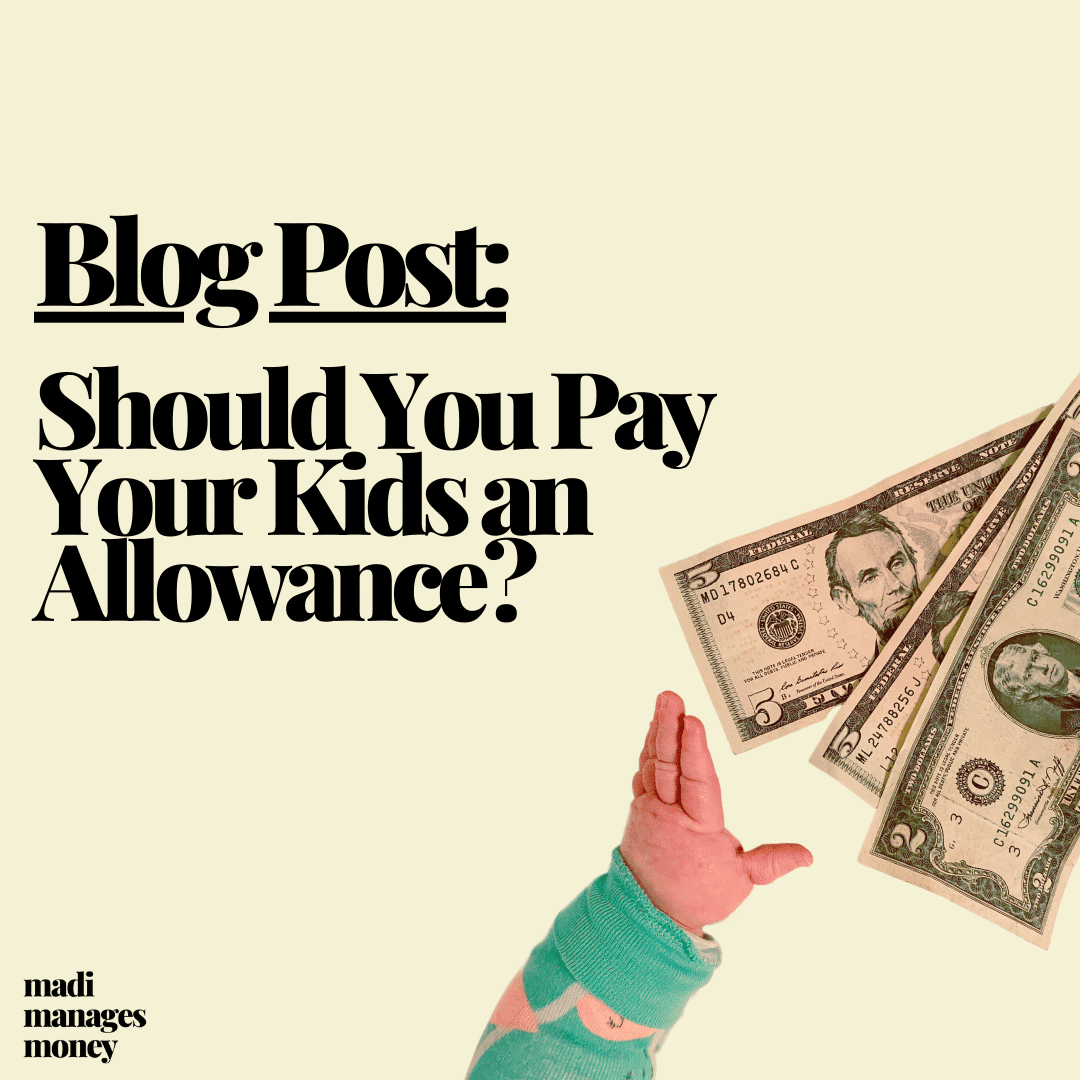Paying for Chores: Should You Pay Your Kids an Allowance?
I’ve always been one for the numbers, but lately, I’ve been heads-down in all the feels that come with family money dynamics.
This has me reflecting on how my family influenced my views on money growing up (and likely fostered my borderline unhealthy obsession with finance🙂) and how I’ll shape my daughter’s perspectives.
In truth, I’m thinking about this so much because I feel pressure to get it right. As a financial planner, there’s added emphasis on money in our household that most “normal” families don’t have.
I don’t want to be the parent with a doctorate in childhood development whose kid is the biter at school, you know?
The funny thing is, when it comes to kids and money lessons, it’s the unintentional ones they’ll absorb and carry into adulthood. Forget the curriculums or the personal finance camp you enrolled your pre-teen in. (Yes, it’s a thing.)
It’s the experiences our kids repeatedly have at home that stick. Further, research shows that children establish lifelong money patterns by age seven.
A practice like paying for chores, as mundane as it might seem, sends a message. It’s these overlooked family habits where my interest lies and what we’ll explore further in this post.
So, should you pay your kids that allowance?
Choose the lesson you want to teach
As many of you graciously (and comically) shared on Instagram, we all experienced different variations of earning an allowance growing up. For most millennial and gen x kids, an allowance worked by completing tasks around your house in exchange for payment.
For our parents, the allowance served multiple purposes. Families distributed the burden of domestic labor, and kids had a few bucks to blow on Airheads from the ballgame snack stand without constantly asking parents for it. (This is mostly why my parents gave my sisters and me any money.)
Finally, and I’d bet most importantly, our parents aimed to teach us an important life lesson: how trading our time for money works.
Having the grit to do so, even on the days you don’t want to, is a big part of being an adult and leading a family.
With a traditional allowance, our parents were preparing us for an adulthood where we traded a defined number of hours for a set amount of pay (i.e., a salary or a livable wage). If you completed what was asked of you and were consistent, this was a pretty straightforward recipe to reach middle-class success.
Herein lies the disconnect.
We now know that isn’t quite how it’s playing out for many millennials, especially those of us with kids. Millennial parents who work in traditional, less-scalable fields like education or healthcare, feel like they’re trading time (and in some cases, lots of it) for average income. Meanwhile, housing, childcare, and higher-education costs have soared since 1990.
The rules of the game have changed.
To be competitive in today’s job market and then actually excel after you’ve landed a job, we have to be entrepreneurial and adaptable with good problem-solving skills. Further, it’s normal today to be hired into a job one year and then have your responsibilities completely transformed by the next, all while you were in the role.
Paying an allowance for specific, task-driven chores reinforces a stale mindset when it comes to trading time for money. Task-masters who need clearly defined job paths or responsibilities will eventually hit a ceiling, and I’m afraid this is the muscle the traditional allowance strengthens. Further, jobs that require you to trade time for money aren’t scalable today.
Trading time for money is always a fallback, but it’s not the message I’ll lead with. I want to teach my children to be purpose-driven and think outside of the box. Being entrepreneurial and ambitious on their own volition is more valuable than teaching them they get $3 every time they put their own laundry away.
(Although, let it be known I am not above a periodic bribe when we’re trying to get out of the door in the morning!)
I don’t want my kids to be conditioned to seek the clean, comfortable path of being rewarded for execution when it requires little executive function. I think it’s unlikely to lead them to future prosperity or career satisfaction.
If-then rewards: when good + good = bad
Here’s where the nuance comes in.
Doing chores is good for kids. Likewise, earning an allowance is good for kids. It’s when we tie one directly to the other, creating an if-then reward, that we send the wrong message.
Requiring your children to do chores instills work-ethic and teaches them there will be times they have to do things they don’t want to do. They should also learn that they’re a valuable member of your family and are expected to contribute as such.
Earning an allowance is also a good thing. It gives kids autonomy and practice at making small-scale spending and saving decisions with their own money. They’ll need these skills to navigate personal finance in the real world without falling flat.
It’s when we link the allowance to specific chores that things go awry, creating an if-then reward. It turns your child’s motivation to complete tasks into one that’s extrinsic and financial instead of one that’s intrinsic or driven by duty as a family member.
As author Daniel H. Pink said in his book, Drive, it sends the wrong message.
“In the absence of a payment, no self-respecting child would willingly set the table, empty the garbage, or make her own bed. It converts a moral and familial obligation into just another commercial transaction – and teaches that the only reason to do a less-than-desirable task for your family is in exchange for payment.”
I am one of four daughters who grew up in a loving and stable but understandably chaotic house. I also played competitive sports and had the opportunity to contribute on high-performing teams. I learned a lot from both.
Understanding you have to work hard to help the people you care about, in my opinion, is the most important lesson chores teach. Linking payment spoils that.
Custodial Roth IRAs: Do chores count as earned income?
I am who I am, so here we are with the hard-core financial planning angle.
If you’ve spent more than six minutes in the parenting and personal finance algorithms on social media, you’ve probably heard of contributing money to a Roth IRA for your kids. In fact, it might be something you’re worried you’re missing out on.
The playbook often goes like this. Parents who own businesses can hire their children and then pay them a reasonable wage for legitimate work.
This can be an effective way to lower a parent’s income tax burden by shifting some earnings into the child’s own tax filing. An earning child can then claim their own standard deduction before working their way up the progressive tax brackets.
Less money for the IRS, more for your family.
The investing implication is that once children have their own earnings, it opens up the option to contribute to a Custodial Roth IRA in the child’s name. Assuming your child earns less than the standard deduction ($13,850 in 2023), this is one of the few legitimate tax-free-on-the-way-in & tax-free-on-the-way-out investing circuits that exist.
We’ve arrived at the gut punch. Sadly, paying for chores does not count as an acceptable earned income source to contribute to a Custodial Roth IRA in the eyes of the IRS. Said plainly, your kids can’t contribute allowance money to a Custodial Roth IRA.
How my family plans to handle paying for chores
I will expect my children to do chores but not in direct exchange for payment.
To me, it’s more valuable that they learn how to contribute as a teammate and family member who does the hard things out of social duty and not just for financial incentive.
(Sidebar: When conducting research for this article, I was met with oodles of “chore price charts” on Pinterest and Etsy. The desire to pay market rates is hysterical, but it also confirms how transactional the allowance feels to kids.)
One method we’re considering is taking a stipend-like approach to sharing money with our children. They’ll still be expected to contribute to household efforts all the same, but they won’t be linked to specific payments.
They can practice with making saving and spending decisions with their allotment. As we can all attest, that’s the fastest way to learn that money is finite.
An added bonus of this approach is that it sets a clear boundary of how much money they should expect from us for their discretionary spending. (I believe this is the primary reason my parents gave us an allowance growing up. We were lousy chore-doers, but it set a limit on how much money we should expect.)
When they get older, we’ve also discussed giving our children open-ended “projects” that require some planning and problem-solving to complete. These would be goals our household is looking to achieve, and someone has to step in and execute.
It could look like this: “Our family wants to install a flower bed in this location. We’ll have check-ins along the way, but I’d like for you to take this from conception to completion during June. Here’s your budget, and you can keep what’s leftover.”
Instead of just taking the trash out a few times a week, jobs like this add a critical thinking element to their “chore” while still benefiting the family. It encourages them to be entrepreneurial and think strategically to bring their project to life.
Will they mess some things up along the way? Absolutely! But I’d rather this be in my flower bed than when the stakes are higher as a young adult.
My daughter is two years old, and I think we’re a little early to be teaching any hard-won lessons about money. It’s also very possible (and likely) I’ll have different views on this by the time she reaches chore-age. She has humbled me many times already in our short two years together!
All this to say please don’t consider this parenting OR financial advice. Good luck out there, and put the kibosh on those if-then rewards!
The opinions voiced in this material are for general information only and are not intended to provide specific advice or recommendations for any individual. To determine which investments may be appropriate for you, consult with your financial advisor.

